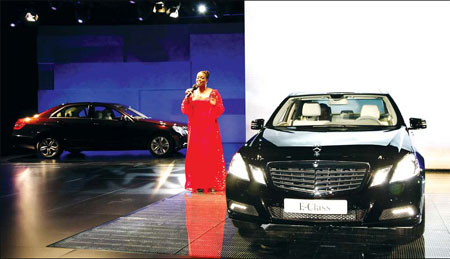Unified sales 'strategic move' for Benz
Updated: 2011-08-08 12:00
By Han Tianyang (China Daily)
|
|||||||||||
|
 |
|
Singer Diane Reeves performs next to the Mercedes Benz E-Class at its launch in Shanghai in 2009. More than 10,000 E-Class sedans were imported last year, but all had not sold before the formal launch of the locally produced version in June. |
BEIJING - German luxury carmaker Mercedes-Benz plans to unify sales management for imported and locally made products to avoid continued internal competition and clear the way for accelerated growth in China amid increasingly high stakes in the luxury segment.
Parent company Daimler AG and local joint venture partner Beijing Automotive Group Co Ltd announced in a joint statement in late July that both sides will "cooperate further in the sales and marketing and align resources."
The statement added that it is a "strategic move" as both sides are investing heavily in new facilities and products to further tap the potential of the Chinese market. But the statement did not disclose a detailed action plan.
Currently Mercedes-Benz (China) Ltd is in charge of selling imported cars in China, while Beijing Benz Automotive Co Ltd - the joint venture between Beijing Automotive Group and Daimler - is responsible for sales of locally made products.
The statement indicates that the German carmaker is moving to resolve the internal friction between Mercedes-Benz (China) Ltd and Beijing Benz after competition between the two entities became increasing intense last year as the locally built E-Class sedan hit the market, said industry observers.
The carmaker's strategy was to first import the new E-Class to China for customers to experience the new model as soon as possible and later introduce the locally made long-wheelbase version.
Mercedes-Benz (China) Ltd imported more than 10,000 E-Class cars to China at the beginning of last year, but it failed to sell all the imports before the formal launch of the locally produced E-Class in June.
To promote sales, dealers greatly lowered the price of the imported E-Class to an even lower level than the local models, which left Beijing Benz in an awkward situation - the joint venture couldn't cut prices on a newly launched local model, but neither could it intervene in the import business.
Deep price cuts could actually harm the brand because a stable price range is important in retaining customer recognition, analysts said.
The problem continued this year as Beijing Benz registered sluggish sales of locally built E-Class cars in the first half.
New sales JV likely
Insiders said Daimler and Beijing Automobile are likely to form a 50-50 joint sales company in China.
The future sales company, independent from the two existing entities, will be responsible for overall planning of Mercedes-Benz's sales in China, both imports and local products, the sources said.
But the plan has another potential stumbling block: Lei Shing Hong Ltd. The Hong Kong-based company is the biggest Mercedes-Benz dealer in China and has a 49 percent stake in Mercedes-Benz (China) Ltd.
A spokeswoman for Mercedes-Benz (China) Ltd would not confirm the plan and said the company has no new information to release in addition to what the joint statement said.
Things then became more complicated as anonymous insiders were quoted by recent Chinese-language media reports saying that instead of a new sales company, the sales and marketing department of Beijing Benz will be taken over by Mercedes-Benz (China) Ltd.
The company also declined to comment on those assertions.
A little more than a month ago, Daimler and Beijing Automotive Group signed a framework agreement in Berlin to co-invest 2 billion euros ($2.82 billion) in local production of new models and engines as well as the establishment of an R&D center.
Knowing well that robust local production is crucial for foreign carmakers to have firm foothold in the Chinese market, Mercedes-Benz plans to greatly hike output and expand product portfolio at the local joint venture.
Beijing Benz now only produces the E-Class and C-Class, with annual capacity of 80,000 cars. The joint venture will build the GLK compact SUV later this year, followed by more models and increase annual capacity to 200,000 units in 2015.
Mercedes-Benz sold more than 95,000 vehicles on the Chinese mainland in the first half of this year, an increase of 59 percent over the same period last year. But only one-third of those sales were locally produced models.
The company envisions that by 2015 the proportion of sales contributed by locally made vehicles could reach 70 percent of its total in China.